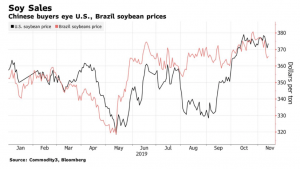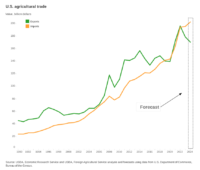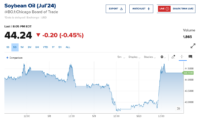Bloomberg's Clarice Couto reported this past Friday that "a surprising tax change in agriculture powerhouse Brazil has the potential to make soy grown in the world’s largest bean exporter less…
As Phase One Talks Continue, China Purchases Some U.S. Farm Products, While USDA Announced a Second Tranche of MFP Payments
Phase One Talks Continue, Amid Chinese Purchases of U.S. Farm Products
Last week, Financial Times writer James Politi reported that, “President Donald Trump threatened a new escalation of the trade war with China, saying US tariffs on Chinese goods would be ‘raised very substantially’ if no truce was reached with officials in Beijing.
“Mr Trump’s comments at the Economic Club of New York highlight the trouble the US administration is having in its efforts to strike an interim deal with China that would bring a halt to the commercial conflict afflicting the world’s two largest economies.
After Mr Trump announced that a tentative agreement had been secured in early October, US and Chinese officials have been haggling over the details, including where a deal would be signed and whether Washington would roll back existing levies as part of such a settlement.
The FT article added that, “Mr Trump said a ‘significant phase one deal with China’ remained ‘close‘ and ‘could happen soon,’ as Beijing was ‘dying to make a deal.’ But he also warned that higher levies would follow if the talks faltered.”
Wall Street Journal writers Chao Deng, Lingling Wei, and William Mauldin reported on Thursday that, “Trade talks between the U.S. and China have hit a snag over farm purchases, as officials seek to lock down the limited trade deal President Trump outlined last month.
“Mr. Trump has said that China has agreed to buy up to $50 billion of soybeans, pork and other agricultural products from the U.S. annually. But China is leery of putting a numerical commitment in the text of an agreement, according to people familiar with the matter.”
The Journal article noted that, “The dispute over farm purchases is one of several issues that have delayed completion of the limited trade accord announced by Mr. Trump and Chinese Vice Premier Liu He on Oct. 11. Both sides are also at odds over whether—and by how much—the U.S. would agree to lift tariffs on Chinese imports, Beijing’s core demand that is linked to its offers on other issues.”
Bloomberg News reported on Thursday that, “U.S. Treasury Secretary Steven Mnuchin said Chinese spending on U.S. farm goods will scale to an annual figure of $40 billion to $50 billion over two years as part of a partial trade agreement, though China has not publicly committed to that value and time frame.”
I hope China not backing down on promise made in Oval Office to buy $50-60B of ag products As family farmer and senator fort number 1 ag state there is nothing more helpful for China public standing w farmers that fulfilling that promise PresZi pls understand
— ChuckGrassley (@ChuckGrassley) November 14, 2019
Also last week, Reuters writer Gabriel Crossley reported that, “China and the United States are holding ‘in-depth’ discussions on a first phase trade agreement, and cancelling tariffs is an important condition to reaching a deal, the Chinese commerce ministry said on Thursday.”
As the trade talks persist, China continues to buy some U.S. agricultural products.
Reuters writers Hallie Gu and Karl Plume reported last week that, “Chinese commercial importers made new purchases of U.S. soybeans this week, according to two sources, even as up to 2 million tonnes of American cargoes were waiting to offload at ports in China as its stockpiler looked for storage room.

“Chinese commercial crushers have bought up to 7 cargoes of American soybeans this week for December and January shipment thanks to competitive U.S. prices versus South American prices and good crush margins in China, said two traders familiar with the matter.”
Private exporters report sales of 129,000 MT of #soybeans for delivery to China during MY 2019/2020. https://t.co/tfbcVkZSPl
— Foreign Ag Service (@USDAForeignAg) November 14, 2019
And Reuters writer Mark Weinraub reported on Friday that, “China continued to buy U.S. farm products in early November, even as uncertainty about a potential settlement to the trade war between the world’s two largest economies roiled the markets, U.S. government data showed on Friday.
The U.S. Agriculture Department’s weekly report on export sales showed that Chinese buyers booked deals to purchase 760,527 tonnes of soybeans in the week ended Nov. 7. U.S. exporters also shipped out 693,527 tonnes of the oilseed China.
The Reuters article indicated that, “Pork export sales to China totaled 5,549 tonnes during the week, the biggest in a month. The USDA said that 10,933 tonnes of U.S. pork were shipped to China during the reporting period, in line with recent weeks.”
Mr. Weinraub added that, “U.S.-China trade talks are set to continue with a telephone call on Friday as both sides seek to hammer out a phase one trade pact, U.S. Commerce Secretary Wilbur Ross said, adding that progress was being made on the agreement’s details.”
Wilbur Ross: 'The first big step' towards dealing with #China https://t.co/ylqATYNdkU@MorningsMaria @FoxBusiness @SecretaryRoss @CommerceGov
— Maria Bartiromo (@MariaBartiromo) November 15, 2019
And Reuters News reported on Saturday that, “China and United States had ‘constructive talks‘ on trade in a high-level phone call on Saturday, state media Xinhua said.
“China’s Vice Premier Liu He, U.S. trade representative Robert Lighthizer and Treasury Secretary Steven Mnuchin were on the call. The two sides discussed each other’s core issues for the first phase of an initial trade agreement, and agreed to maintain close communication, according to Xinhua.”
“White House economic adviser Larry Kudlow said on Thursday the two countries were getting close to an agreement about ending their 16-month trade war, but he gave no further details on the timing of a possible deal,” the Reuters article said.
On Monday, Yun Li reported at CBNC Online that, “The mood in Beijing about a trade deal is pessimistic due to President Donald Trump’s reluctance to roll back tariffs, which China believed the U.S. had agreed to, a government source told CNBC’s Eunice Yoon.”
Mood in Beijing about #trade deal is pessimistic, government source tells me. #China troubled after Trump said no tariff rollback. (China thought both had agreed in principle.) Strategy now to talk but wait due to impeachment, US election. Also prioritize China economic support.
— Eunice Yoon (@onlyyoontv) November 18, 2019
The CNBC update noted that, “The Chinese are looking carefully at the political situation in the U.S. including the impeachment hearings and the presidential election, the source said, adding the officials are wondering if it is more rational to wait things out since it is unclear what Trump’s standing will be even in a few months.
“There is disagreement over issues such as a specific number of agricultural purchases, the source said. The Chinese are resisting because, in part, they could risk alienating other trading partners, the source told CNBC.”
In other U.S., China trade developments, Josh Zumbrun reported last week at The Wall Street Journal Online that, “China has agreed to lift a more than four-year-old ban on U.S. poultry imports, both governments said, in what a U.S. industry group said could lead to sales of about $2 billion of poultry.
“American poultry had been banned in China since 2015 following an outbreak of avian influenza, and the two sides have discussed lifting the ban as part of the trade negotiations between Beijing and Washington.”
USDA Issues Second Tranche of Market Facilitation Program
Reuters writer Tom Polansek reported on Friday that, “The U.S. Department of Agriculture said on Friday it will begin making a second round of 2019 trade aid payments to U.S. farmers next week.
“The payments are the second part of a three-tranche $16 billion aid package announced in May to compensate farmers for the U.S.-China trade war. China imposed tariffs on key U.S. agriculture exports including soybeans and pork last year after U.S. President Donald Trump’s administration levied duties on Chinese goods.
“Farmers will now be eligible to receive 25% of the total payment expected, in addition to the 50% they already received in the first round of the 2019 package, the USDA said in a statement.”
Our great Farmers will recieve another major round of “cash,” compliments of China Tariffs, prior to Thanksgiving. The smaller farms and farmers will be big beneficiaries. In the meantime, and as you may have noticed, China is starting to buy big again. Japan deal DONE. Enjoy!
— Donald J. Trump (@realDonaldTrump) November 17, 2019
The Reuters article explained that, “Sign-ups for the payments will run through Dec. 6, the statement said. If conditions warrant, the third tranche will be made in January 2020, it said.
“The United States and China are trying to negotiate a phase one trade pact to end the tensions, but it is unclear when it might be finalized.”







